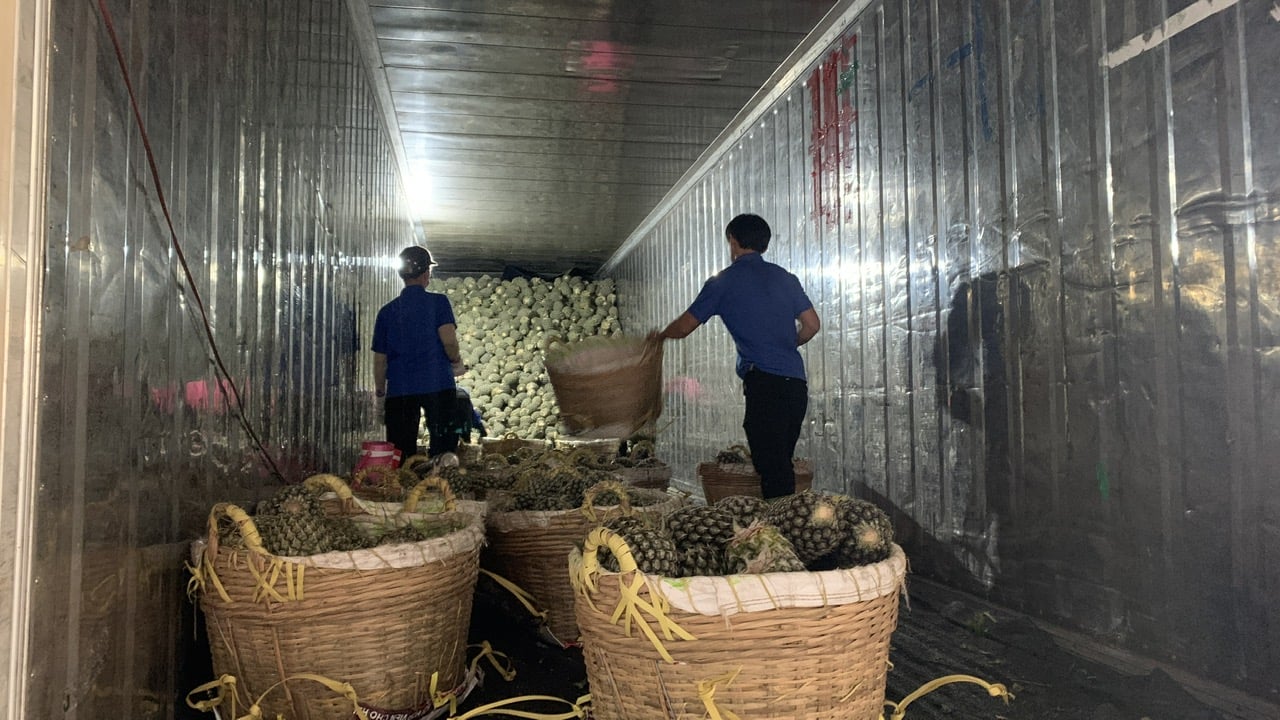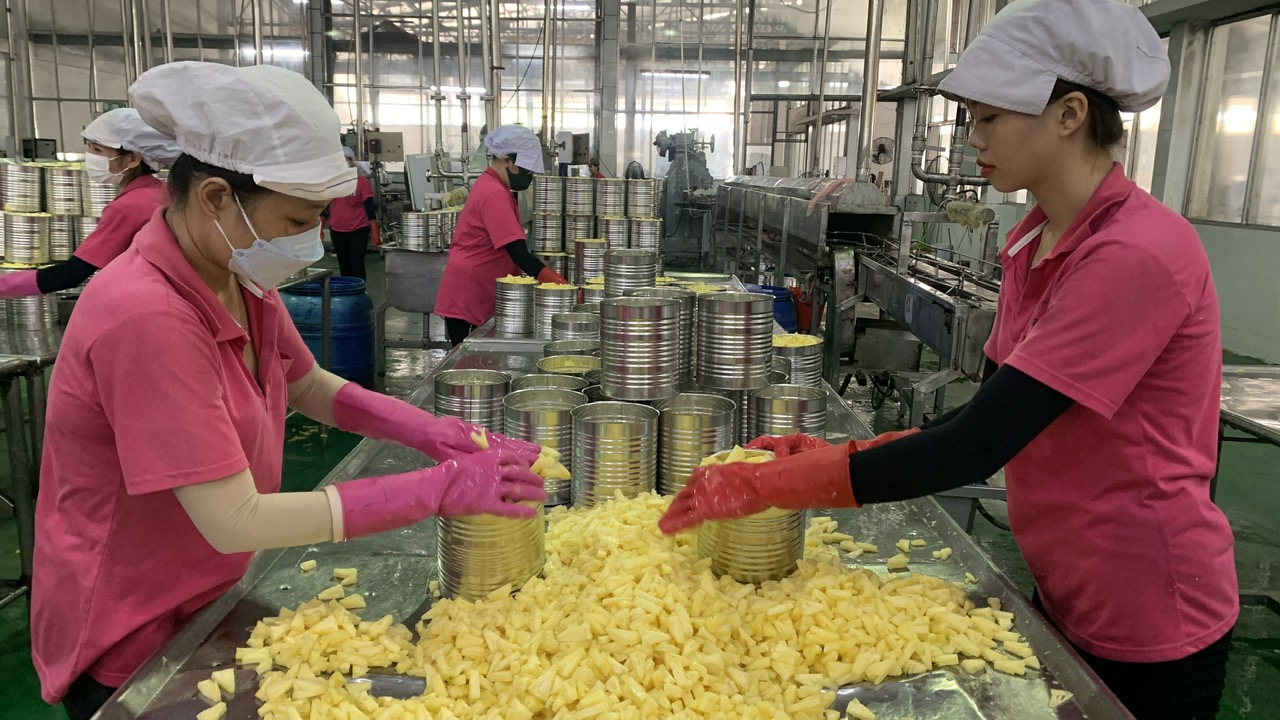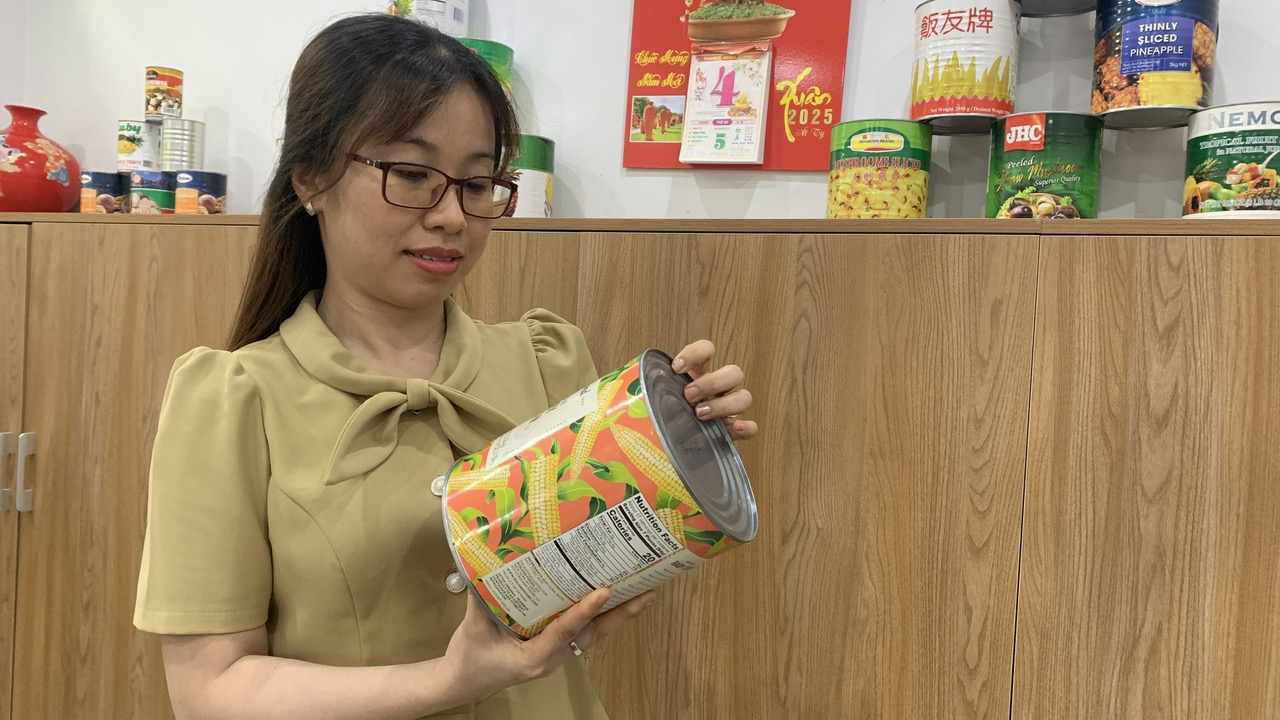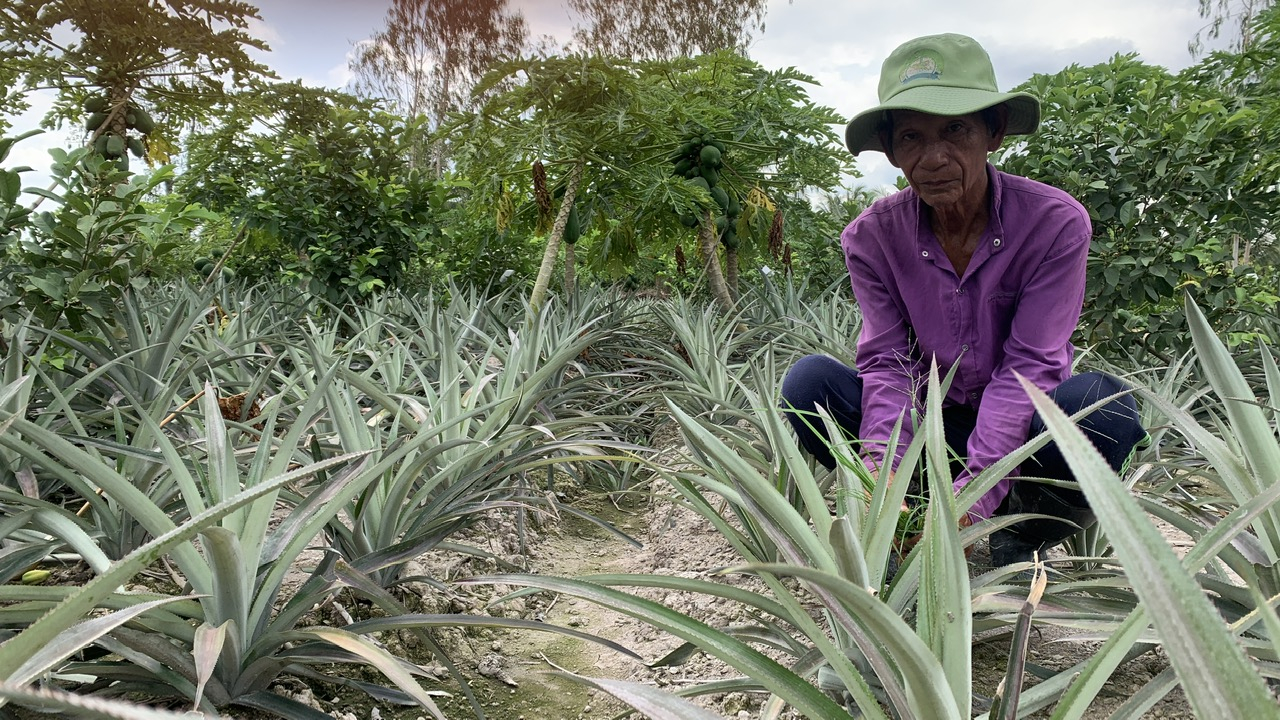December 2, 2025 | 05:24 GMT +7
December 2, 2025 | 05:24 GMT +7
Hotline: 0913.378.918
December 2, 2025 | 05:24 GMT +7
Hotline: 0913.378.918

Workers are unloading pineapples from the truck to the processing factory. Photo: Ho Thao.
In recent years, pineapple has become one of Vietnam’s key agricultural export products. Canned pineapple products have increasingly captured market share in Europe and North America by meeting strict food safety standards and using modern preservation and processing technologies.
In the Mekong Delta, many businesses have boldly invested in production lines that meet international standards such as GlobalGAP and HACCP, enabling Vietnamese agricultural products to enter demanding markets. Quoc Thao Company Limited (in Vinh Long province) stands out for proactively developing clean pineapple raw material areas and linking production with consumption to enhance the export value chain.
According to Mrs. Ma Thi Kim Giang, Assistant Director of Quoc Thao Company, the company supplies about 2,000 tons of agricultural products monthly to markets including Japan, the U.S., Italy, and Hong Kong. Of this, canned pineapple accounts for around 80%. After harvesting, pineapples are processed, sterilized, and canned using modern technology, allowing them to be preserved under normal conditions for up to three years.
“All products meet import standards of the U.S. and Europe, giving the company many opportunities to expand its international market share,” Mrs. Giang affirmed.

Workers are packing pineapples. Photo: Ho Thao.
Currently, to ensure a stable and high-quality raw material supply for export, the company has leased 250 hectares of land for pineapple cultivation in the communes of Long Ho, Tan Quoi, and Tra On. At the same time, the company has signed output contracts with more than 100 local farmers. In addition to purchasing products at market prices, the company also supports initial investment costs of up to 500 million VND per hectare. This amount is gradually deducted through purchase installments at a rate of 30%, helping farmers avoid large loans when switching crops.
Not limited to the southern region, the company has expanded its pineapple growing areas to northern provinces such as Thanh Hoa and Nghe An. The total linked pineapple cultivation area now exceeds 3,000 hectares. Additionally, the company cooperates with 12 purchasing agents spanning from north to south to ensure a stable supply of raw materials for the processing factory.

A sample product from Quoc Thao Company exported to the U.S. Photo: Ho Thao.
Production partnerships have also brought many positive changes for farmers. Mr. Dinh Van Mai from Phu Quoi commune, Vinh Long province, shared: “I used to mainly grow sweet potatoes and rice, but my income was unstable due to unpredictable weather and frequent pests. Since switching to pineapple cultivation through the company’s partnership, I have received production cost support of 5 million VND per cong of land, technical guidance, and guaranteed output purchase. Besides farming, I also work as a laborer on the company’s farm, earning a stable monthly income of about 15 million VND, which has made life much easier.”
According to Mr. Mai, workers only work 8 hours a day, the company pays wages on time, provides decent accommodation and modern machinery for land preparation and plant care. Working extra on Sundays earns overtime pay. Even during harvest season, there’s no worry about price pressure because the company buys at market prices.

Mr. Dinh Van Mai is tending the pineapple garden. Photo: Ho Thao.
From a state management perspective, Mr. Chau Vinh Phuc, Deputy Head of the Plant Production and Protection Sub-Department in Vinh Long province, highly appreciates the pineapple raw material linkage model implemented by Quoc Thao Company. “This is a sustainable partnership model that brings practical benefits to both businesses and farmers. On the local side, we will continue to encourage people to switch from less efficient crops to pineapple, while coordinating training courses on safe cultivation techniques to help farmers produce according to standards and meet export requirements.
Quoc Thao Company not only plays a leading role in developing export agriculture but also contributes to creating jobs for about 600 regular workers at the factory and over 5,000 workers in the supply chain. This is an important factor in retaining rural residents, stabilizing livelihoods, and affirming the role of businesses in sustainable agricultural development,” Mr. Phuc said.
Currently, Vinh Long province has about 250 hectares of pineapple plantations, mainly concentrated in the communes of Phu Quoi, Tam Binh, and Tra On. With advantages in soil, climate, and convenient transportation infrastructure, the locality aims to double the pineapple cultivation area soon to meet the growing export demand.
$ 1 = VND 26.170 - Source: Vietcombank.
Translated by Phuong Linh

(VAN) The signing of a protocol between Viet Nam and China on the export of fresh jackfruit represents a significant milestone in agricultural trade cooperation between the two countries.

(VAN) On November 27, the Ninh Binh Department of Agriculture and Environment and the Institute for Green Growth Research organized a training course on greenhouse gas inventory for businesses.

(VAN) China’s cooking oil is suddenly flooding into India. It all comes down to a soybean surplus that Beijing doesn’t quite know what to do with.

(VAN) An Giang promotes supply-demand connections, standardizes quality and builds value chains, creating a foundation for sustainable bird’s nest development and aiming to expand exports.
/2025/11/24/5339-4-nongnghiep-075331.jpg)
(VAN) Recently, the conference on 'Sustainable Fisheries Linkage Chain - Tilapia for Export' took place in Tien Hai commune, Hung Yen province.
/2025/11/21/4309-2-153400_128.jpg)
(VAN) Green and low-emission rice is paving the way for Vietnamese rice to enter high-end markets, marking the beginning of a transformation journey toward greening and elevating the national rice brand.

(VAN) ‘Right to Win’ outlines a national action plan that shapes a new vision for Viet Nam’s agriculture in an era of renewal and global integration.